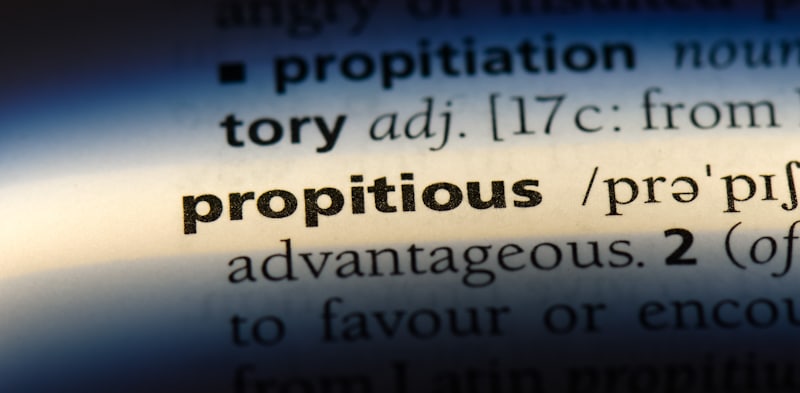A head-start in anything you do or want to pursue in life is always handy. To get that initial push forward, people from specific communities do certain things considering them to be “auspicious”. This begs the question: What is “auspicious”, and how to use the word in texts?
The term “auspicious” refers to a moment or situation that’s positive or signaling good things ahead. You can also use the adjective in texts to signify “correct or opportune time” to do something. “Auspiciousness” is its noun form, and “auspiciously” is its rarely used adverb variant.
“Auspicious” is not a complex term to incorporate in texts or ascertain when to use it – provided you’ve got its meaning right. But since the word could mean slightly different things, and then there’s also the possibility of getting it mixed up with its synonyms, it’s imperative to learn a bit more about the term than just its definition. Read on to learn everything there is to “auspicious”, how to use it in your sentences, and more.

“Auspicious” – Meaning
The term “auspicious” means or signifies “likely success in the future”. “An auspicious beginning” denotes “filled with promises” or “a good start or sign”. It could inspire hope. “Auspicious” could also mean “opportune time”.
“Auspicious” and Its Synonyms
Other words or synonyms for the term include “propitious”, “felicitous”, “favorable”, “golden”, “halcyon”, etc. The plural form “auspices” means “patronage and guidance”. Words not necessarily synonymous but related to “auspicious” are:
- fortuitous
- fortunate
- providential
- prosperous
- salutary
- advantageous, etc.
Even some of the synonyms are not necessarily perfect replacements for “auspicious”. For instance, the term “favorable” implies “a given circumstance is advantageous” or “the people involved are helpful or approving”. “Auspicious” doesn’t denote that – at least not directly and certainly not always.
Similarly, “propitious” is interchangeable with “auspicious” only at times, since the former signifies “a favorable condition that’s continuing”. “Auspicious”, on the other hand, emphasizes the current circumstance or moment and doesn’t necessarily talk about the “ongoing” nature of it. It does, however, instill hope, as mentioned earlier.
The derivative terms of the word include “auspiciously” and “auspiciousness” – its respective adverb and noun forms.

The Term’s Origin
The word “auspicious” has its roots in “auspex”, a Latin term that means “bird seer”.
In ancient Rome, priests were referred to as “bird seers” who studied birds’ feeding and flight patterns. And with the observations they made, they were able to forecast things to considerable accuracy.
If a bird behaved in a way that was considered “ideal”, the priest would claim favorable future scenarios. However, if the bird’s movements were not in the correct pattern, they signified trouble.
The noun “auspice” originally denoted this ritual of observing birds to discover auguries. Not to mention, “auspice” too is derived from “auspex”.
Using the Word “Auspicious” in Texts
“Auspicious” marks “the beginning of something great to look forward to”, and it is commonly used in sentences to denote that. Here are a few sentences illustrating that:
- Winning the very first match of his Grand Slam debut, the young tennis star was off to an auspicious start.
- During this auspicious occasion, I would like to announce that I am presenting a car to my secretary for her dedication and hard work throughout the years.
- On that auspicious day, everyone set aside their differences and animosities and pledged to not bring family feuds, religion, politics, etc., between them ever again.
- The archbishop headed the wedding ceremony and gave a relatively long sermon on the auspicious occasion.
- The auspicious day dawned.
- It was an auspicious start to a meaningful conversation.
- The game concluded in a highly auspicious manner.
“Auspicious” means “good sign” too, and here are a couple of sentences using the term to connotate the same:
- In their culture, the particular shade is believed to be auspicious, which is why the color is worn by the citizens during important events.
- The darkening clouds made her believe the day wasn’t auspicious for the trip.
And because “auspicious” could also mean “the right time” to do something, here are some sentences that incorporate the word in that sense:
- He was well aware that the beginning of the year was the most auspicious time to launch his venture.
- Since everyone in the room was feeling merry and exhibiting their generosity in their own ways; we thought the time was auspicious to solicit donations for our charity.
- After receiving accolades from all corners for her work on the critical project, Margaret thought the moment was auspicious to ask her boss for a promotion.
- It couldn’t have taken place at a time more auspicious than that for the country’s coastal guards.
- She entered the business at an auspicious time when the company had just broken even after having strived for five years in the industry.
- During these less auspicious electoral scenarios, a well-devised strategy would help our party not lose the elections badly.

Using Synonyms of “Auspicious” in Texts
As mentioned above, “auspicious” has quite a few synonymous terms or words that you could use as replacements. For example:
- It was auspicious timing.
The above sentence could use “golden” in place of “auspicious” and still mean the same thing.
- It was golden timing.
However, not all words considered synonyms of “auspicious” can replace the word in texts, as their meanings could be slightly different.
For instance, “halcyon” is a term related to “auspicious” that means “calm and peaceful”. Quite clearly, you cannot use the word in place of “auspicious” in texts. But since the term denotes something that’s looked at as “favorable”, it certainly is in close proximity to “auspicious” as far as their definitions go.
Though “propitious” is not a perfect replacement term for “auspicious”, it does get used in texts as such. For example:
- The time was auspicious to start the business.
- The time was propitious to start the business.
Also, “propitious” is commonly used in business or formal texts in place of “auspicious” whenever the need arises.
Example Sentences with the Term “Auspicious”
The following are sentences using the word “auspicious”:
- It was an auspicious start.
- Such an auspicious beginning shall only bring in honor and more success.
- In some parts of the world, rain before or during a wedding is considered auspicious.
- Is today an auspicious day to start the journey?
- She is banking on the coming together of the various auspicious events.
- Eating long noodles without cutting them short is considered auspicious in the country. The cooks who prepare those noodles also strive not to break the traditional food during cooking.
- There were several technical issues, in the beginning, resulting in a not so auspicious initial impression.
- It was pretty auspicious timing.
- He took over as the editor-in-chief of the newspaper on an auspicious day.
- Even though we are still six months away from the end of the year, it feels auspicious already.
- Their first meeting wasn’t the most auspicious. They had a major altercation.
- Auspicious day and timing are major requisites for Hindu weddings, particularly the ones arranged by the parents of the bridegroom and the bride.
- With two consecutive wins, the season started on an auspicious note for the team.
- The moment was as auspicious as it could get in their zen ambiance.
- Wouldn’t it then be an auspicious time to tell him that his son was not dead?
- For the conspirators, 15th July was an auspicious date.
- The auspicious and jubilant series of events transcended her tallest hopes.
- It was clear that specific buildings during those times were reserved for auspicious events.
- They thought they got off to an auspicious start, having no idea about the troubles that were lying ahead.
- It was barely an auspicious time for innovating and experimenting with things.
- For reasons both political and economic, the times weren’t auspicious for the new subdisciplines to flourish.
The inflections or word variants of “auspicious”, such as “auspiciously” and “auspiciousness”, are not as commonly used in texts as the adjective form. Regardless, here are a few sentences incorporating those terms:
- She seized the moment for its auspiciousness.
- My sincere congratulations on your victory and I wish this auspiciousness lasts you for life.
- The tale pointed out the auspiciousness of the symbols.
- Like the year before, this year too did not start auspiciously.
- Our weekend in the city didn’t begin auspiciously.
- The ending was quite revolting for something that had begun so auspiciously.
- The new moon’s rising was a sign of auspiciousness.
Conclusion
If a thing indicates “auspiciousness”, it may mean “likely success” – which, however, cannot be taken for granted or relied upon completely.
Athletes, artists, working professionals, etc., get off to “auspicious” starts in their respective fields but fail to keep up the momentum or do not succeed in the long run. “Auspicious” signals hope but it doesn’t predict or guarantee anything. Hard work is what turns “auspiciousness” into real or long-term success.
As mentioned in one of the paragraphs above, there is a subtle, yet clear difference in meanings between “auspicious” and “propitious”. Though these terms could be used in texts interchangeably to an extent, the same may not work for some of the other synonyms or related terms mentioned above.
Be wary of that when using the adjective “auspicious” in your texts or trying to use similar words in its place.
Shawn Manaher is the founder and CEO of The Content Authority. He’s one part content manager, one part writing ninja organizer, and two parts leader of top content creators. You don’t even want to know what he calls pancakes.

